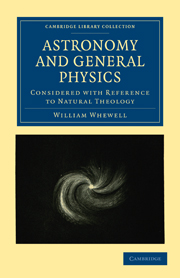Book contents
- Frontmatter
- NOTICE
- Contents
- INTRODUCTION
- BOOK I TERRESTRIAL ADAPTATIONS
- BOOK II COSMICAL ARRANGEMENTS
- CHAP. I The Structure of the Solar System
- CHAP. II The Circular Orbits of the Planets round the Sun
- CHAP. III The Stability of the Solar System
- CHAP. IV The Sun in the Centre
- CHAP. V The Satellites
- CHAP. VI The Stability of the Ocean
- CHAP. VII The Nebular Hypothesis
- CHAP. VIII The Existence of a Resisting Medium in the Solar System
- CHAP. IX Mechanical Laws
- CHAP. X The Law of Gravitation
- CHAP. XI The Laws of Motion
- CHAP. XII Friction
- BOOK III RELIGIOUS VIEWS
CHAP. V - The Satellites
from BOOK II - COSMICAL ARRANGEMENTS
Published online by Cambridge University Press: 05 August 2011
- Frontmatter
- NOTICE
- Contents
- INTRODUCTION
- BOOK I TERRESTRIAL ADAPTATIONS
- BOOK II COSMICAL ARRANGEMENTS
- CHAP. I The Structure of the Solar System
- CHAP. II The Circular Orbits of the Planets round the Sun
- CHAP. III The Stability of the Solar System
- CHAP. IV The Sun in the Centre
- CHAP. V The Satellites
- CHAP. VI The Stability of the Ocean
- CHAP. VII The Nebular Hypothesis
- CHAP. VIII The Existence of a Resisting Medium in the Solar System
- CHAP. IX Mechanical Laws
- CHAP. X The Law of Gravitation
- CHAP. XI The Laws of Motion
- CHAP. XII Friction
- BOOK III RELIGIOUS VIEWS
Summary
1. A person of ordinary feelings, who, on a fine moonlight night, sees our satellite pouring her mild radiance on field and town, path and moor, will probably not only be disposed to “bless the useful light,” but also to believe that it was “ordained” for that purpose;—that the lesser light was made to rule the night as certainly as the greater light was made to rule the day.
Laplace, however, does not assent to this belief. He observes, that “some partisans of final causes have imagined that the moon was given to the earth to afford light during the night:” but he remarks that this cannot be so, for that we are often deprived at the same time of the light of the sun and the moon; and he points out how the moon might have been placed so as to be always “full.”
That the light of the moon affords, to a certain extent, a supplement to the light of the sun, will hardly be denied. If we take man in a condition in which he uses artificial light scantily only, or not at all, there can be no doubt that the moonlight nights are for him a very important addition to the time of daylight. And as a small proportion only of the whole number of nights are without some portion of moonlight, the fact that sometimes both luminaries are invisible very little diminishes the value of this advantage.
- Type
- Chapter
- Information
- Publisher: Cambridge University PressPrint publication year: 2009First published in: 1833



